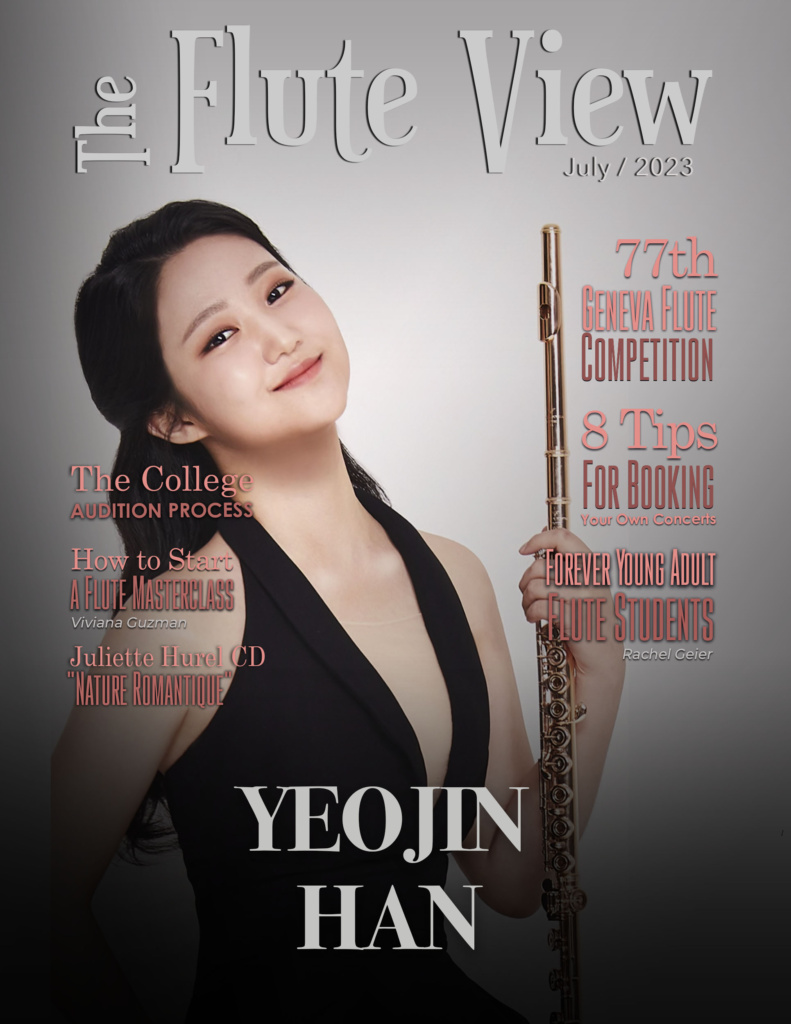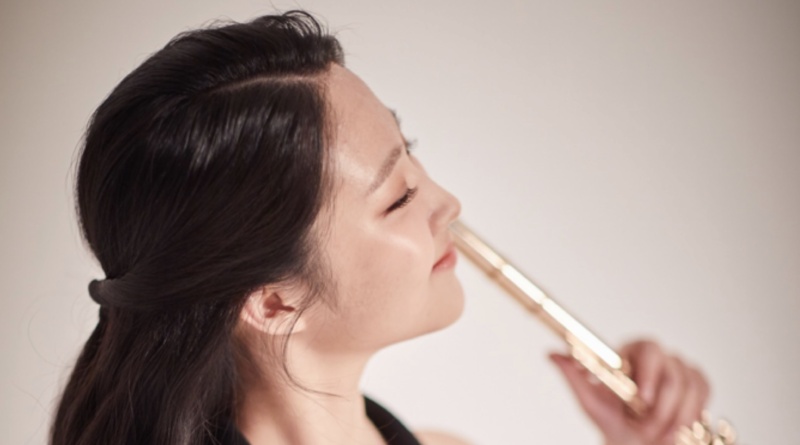Yeojin Han Artist Interview
Yeojin Han is the Principal flutist of NDR Elbphilharmonie Orchestra, the 3rd Prize and Audience Prize winner of the 9th Kobe International flute competition. Yeojin Han is a Powell Flutes Artist.
Can you give us five career highlights?
5th Carl Nielsen International Competition - Honorable mention (youngest awardee at 13 years old).
9th Kobe International Flute Competition - 3rd place & Audience Prize (youngest awardee at 15 years old).
3rd Maxence Larrieu International Flute Competition - 4th prize, Young Artist Prize, and Special Prize for Best Interpretation of Commissioned Piece (youngest awardee at 14 years old).
Principal Flutist of the NDR Elbphilharmonie Orchestra (at 21 years old).
Principal and Second Flutist of Gewandhaus Orchestra - temporary position (from 19 to 21 years old).
How about three pivotal moments that were essential to creating the artist that you've become?
Firstly, the performance at the Barcelona Flute Convention in 2011 was my first concert in Europe. After that concert, I specifically developed my dream of becoming a musician. I participated in various international competitions, and the positive results provided me with opportunities to perform on renowned stages, allowing me to grow as an artist.
The second pivotal moment was meeting my Professor Andrea Lieberknecht, who helped me break out of my comfort zone. She provided me with numerous musical inspirations and kept me motivated to take on new challenges. Through continued growth and exploration, I eventually joined the Gewandhaus Orchestra, where I had the opportunity to experience a wide range of music that I had never encountered before. This transformative experience shaped me into the artist I am today and ultimately led to my position as Principal Flutist of the NDR Elbphilharmonie Orchestra.
Congratulations on your new appointment. How was the audition process for you?
Thank you! I'm typically not easily nervous, but given the magnitude of the audition, I experienced some nervousness. However, I made an effort to keep my mind calm and composed. The audition process involved two rounds on the same day. I performed Mozart's concerto, several orchestral excerpts, and the fourth movement of Prokofiev's Sonata. I believe I was able to showcase my strengths well, especially when playing the Sonata, which is one of my favorites.
What was the best and worst part of the audition?
The worst part of the audition for me was not being able to perform Strauss' "Sinfonia Domestica" as I had envisioned. I believe many flutists can relate to the challenges posed by this piece, particularly regarding intricate finger techniques. On the other hand, I interpreted and played the Prokofiev Sonata differently from how I had initially prepared. I injected a heavier touch into my performance that day, which I felt was an improvement.
How did you prepare for the audition?
I was already well-acquainted with Mozart's concerto and the required orchestral excerpts due to my previous audition experiences. However, to infuse new ideas, I listened to various interpretations on YouTube and made some adjustments. As the audition required solo flute performances, I listened attentively to the music to internalize the orchestra's flow, even though I would be playing alone. As for the Prokofiev Sonata, I had to prepare it without guidance from anyone, and this allowed me to showcase my individuality, despite some rough spots in my performance.
What recommendations would you give to others preparing for an important audition?
Instead of practicing alone, I found it helpful to imagine myself as a member of the orchestra while practicing, with the music playing in the background. This intensified my focus and resulted in a more professional performance. It is more crucial to concentrate on the music itself rather than fixating on potential mistakes. Direct your attention to the music you wish to present at the audition. Remember that making mistakes is part of being human. Lastly, broadening your tonal and character range by listening to a variety of music genres, particularly opera, can help shape your unique musical identity.
What do you like best about performing?
Overall, the most rewarding aspect of performing is the ability to directly feel the audience's reactions and emotions while on stage. These moments often inspire performers with new directions and fresh insights. While the advancement of technology and the emergence of online concerts due to the COVID-19 pandemic have improved sound quality, the essence of live concerts should never fade away.
During live concerts, performers make eye contact with the audience, synchronize their breathing, and share the same physical space. They even share the tension and anticipation in the air. These unique experiences vary each time depending on the performer and the audience. I believe all of these elements contribute to the power and magic of music.
After experiencing these moments together and receiving applause from the audience, that is the true highlight of any concert.
CD releases?
I have released an online album with Universal Musik Korea featuring Chopin's Nocturne No. 20 in C sharp minor. You can listen to it here.
What does your schedule look like for the next six months?
In the next six months, my schedule includes a recital in Korea on July 7th and 19th, as well as performing as a solo flutist in the Going Home Project Orchestra in Korea. Following these performances, I plan to take a short break from music and focus on my new job in Hamburg, where I anticipate engaging in significant activities related to my position.
What are your personal and professional goals?
As an immediate goal, I aim to integrate well with my new orchestra and establish myself as a respected Principal Flutist. Furthermore, as a young musician, I aspire to challenge myself in international competitions, driven by my ambition as a soloist. Above all, my ultimate and most important goal is to remain a humble and grateful musician throughout my career.
What inspires you the most in life?
I find my greatest inspiration through interactions with exceptional musicians. Conversations with them allow me to gain insights into their thoughts and their profound love for music. When I listen to them perform, I can sense the genuine emotions they infuse into their music. This process of revealing the inner depths of music also reveals a side of myself that I may not even be aware of.
What has been your greatest professional challenge?
I have faced numerous challenges throughout my career, but the most significant one to date was the Biwako International Flute Competition in Japan, which I participated in at the age of 13. While it may not have been widely known globally, it was a competition where I competed against adults alone. I was inexperienced and unaware of what a competition entailed or even where I was. It was solely my passion that led me to emerge victorious. I believe that sometimes the best time to tackle a challenge is when you approach it fearlessly, without overthinking the consequences.
What has been your greatest personal challenge?
Every stage performance presents a challenge for me. I continually identify my weaknesses and strive to address them one by one. Each stage and every moment becomes an opportunity to surpass my limitations. Additionally, a new challenge I have recently undertaken is creating content on YouTube. I handle all aspects, from filming to editing, sharing glimpses of my daily life and thoughts. Life is a unique journey, and being able to experience others' lives, even indirectly through videos, holds a certain allure for me.
Who were your music mentors, and what did you learn from them?
My mentor is Professor Andrea Lieberknecht. She not only taught me valuable lessons about music and musical inspiration but also provided significant guidance on personal growth. Until recently, I had been a monotonous person, reluctant to face challenges or consider others. During a time when I felt lost and unsure of my path, she supported me in finding my own individuality and reigniting my passion for music. Her unwavering support, patience, sincere heart, and trust in the teacher-student relationship taught me not only about music but also about boundless trust and respect.
Can you share five quirky, secret, and fun hobbies or passions?
Here are a few quirky, secret, and fun aspects of my life:
If there's a finger technique that doesn't work out until a few days before a concert, I purposely practice it incorrectly to avoid panicking. Almost all of my mistakes are planned. It's my secret technique.
I often practice while lying in bed. Surprisingly, I discovered that the body's exhaustion creates a resonant sound. It's quite amusing.
One of my hobbies is reading books. I enjoy the boundless imagination and diversity that books offer, surpassing even that of movies.
What three pieces of advice would you offer to a young flutist?
An interesting story I have is when I was practicing intensely the day before a competition, my mother told me, "If you practice hard today, it won't make a difference. Go to sleep." This advice taught me the importance of managing my condition and taking care of myself a few days before important performances. Practice diligently, but also prioritize self-care.
Take the time to seriously reflect on your identity as a musician. Set goals for yourself, but avoid the temptation of comparing or competing with others. Stay true to your unique path. Being yourself is crucial in creating your own music.
Keep a practice journal every day, not just to record what you practiced but also to document your sound condition, finger condition, and other observations. This will help you establish your average condition and discover ways to improve your sound, technique, and musicality. By observing yourself and seeking solutions, you will gain confidence even when facing auditions or performances with fluctuating conditions.

